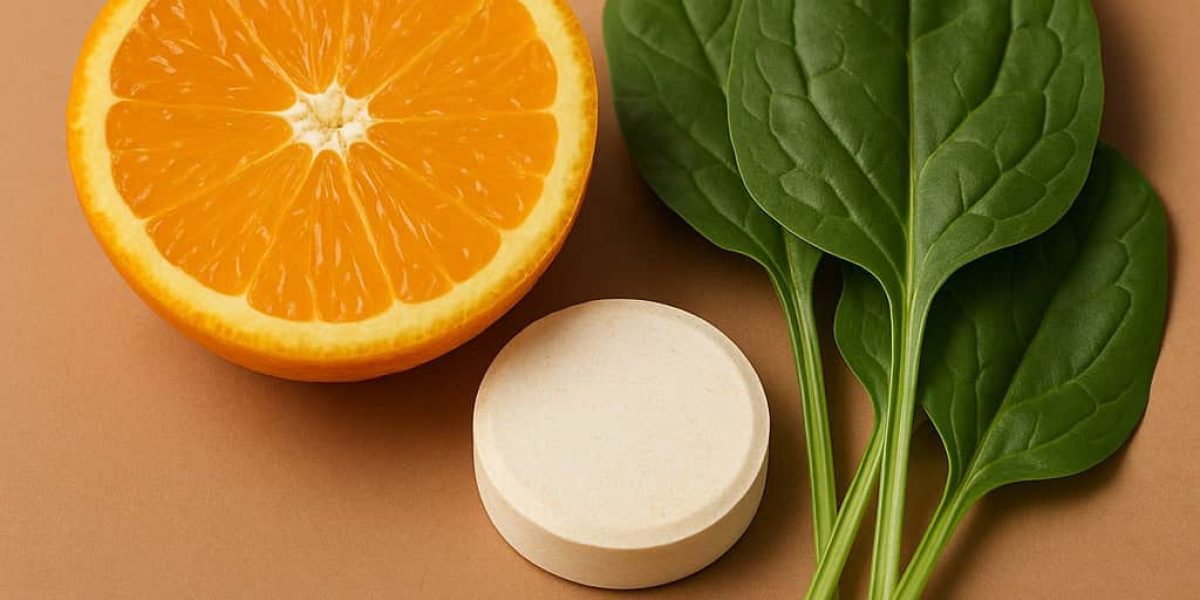Have you been feeling sluggish lately or noticing that small wounds are taking longer to heal? You may be dealing with a vitamin C deficiency. Although this is less common today than it used to be, it is still important to be aware of the signals your body is sending.
At Dutch Balance, we are happy to help you support your health in the best possible way. In this article, we explain what vitamin C does for your body, how to recognize a deficiency and what you can do about it.
What is vitamin C and why do you need it?
Vitamin C, also known as ascorbic acid, is a water-soluble vitamin that is essential for your health. Unlike many animals, our bodies cannot produce this important nutrient on their own. Therefore, we are completely dependent on our diet to meet our daily needs.
The recommended daily allowance for adults is 75 milligrams per day. Pregnant women need a little more (85 mg) and breastfeeding women a little more (135 mg).
Vitamin C performs several important functions in your body:
- It supports your resistance and immune system
- It helps form collagen for healthy skin, bones and blood vessels
- It improves the absorption of iron from plant foods
- It acts as an antioxidant and protects your cells from damage
- It contributes to the normal functioning of your nervous system
How do you recognize vitamin C deficiency?
A vitamin C deficiency usually develops gradually. In fact, your body can build up a supply for about three months. Only with prolonged insufficient intake can you develop symptoms.
The first signs of vitamin C deficiency are often:
- Fatigue and general weakness Many deficient people feel sluggish and weak. This is because vitamin C is involved in releasing energy into your cells.
- Decreased resistance Do you notice that you get colds more often or that infections last longer? Vitamin C plays an important role in your immune system.
- Slow wound healing Small cuts or scrapes that normally heal quickly may last much longer with deficiency. Bruising may also be more frequent.
- Gum and tooth problems Inflamed or bleeding gums can be a sign of vitamin C deficiency. In severe cases, this can even lead to tooth loss.
- Skin and hair complaints Dry, flaky skin and dull, brittle hair can indicate deficiency. Hair loss is also more common.
- Joint pain and stiffness Vitamin C is needed to maintain cartilage and connective tissue. Deficiency can lead to joint discomfort.
Who is at extra risk for vitamin C deficiency?
Although vitamin C deficiency is relatively rare in the Netherlands, certain groups are at higher risk:
- People with a one-sided diet or few fruits and vegetables
- Smokers (smoking significantly increases the need for vitamin C)
- Elderly people who eat a less varied diet
- People with increased alcohol consumption
- Persons with certain medical conditions that affect nutrient absorption
The best sources of vitamin C
Fortunately, vitamin C is abundant in many foods. The best sources are:
Vegetables:
- Red bell bell pepper (150 mg per 100 grams)
- Brussels sprouts (150 mg per 100 grams)
- Kale (100 mg per 100 grams)
- Broccoli (90 mg per 100 grams)
Fruit:
- Kiwi (79 mg per 100 grams)
- Strawberries (60 mg per 100 grams)
- Orange (50 mg per 100 grams)
- Citrus fruits in general
Note, however, that vitamin C is sensitive to heating. Therefore, cook vegetables briefly and in little water to preserve as many vitamins as possible. Raw fruits and vegetables are ideal sources.
When does a vitamin C supplement make sense?
With a varied diet that includes enough fruits and vegetables, you normally get more than enough vitamin C. Still, vitamins and minerals in supplement form can be a valuable addition in certain situations.
Consider additional support if you:
- Has difficulty eating enough fruits and vegetables
- Often experiences stress or suffers from fatigue
- Intensive sports
- Smokes or regularly consumes alcohol
- Are recovering from an illness or surgery
- In winter seek extra support for your resistance
Important advice
Although dietary supplements can be a valuable supplement, they never replace a varied and balanced diet. Do you suspect a serious vitamin C deficiency or experience persistent symptoms? If so, always consult your physician first for a proper diagnosis.
At Dutch Balance, we are always ready to advise you on the best way to support your health. Our quality products are extensively tested and meet all legal requirements.




